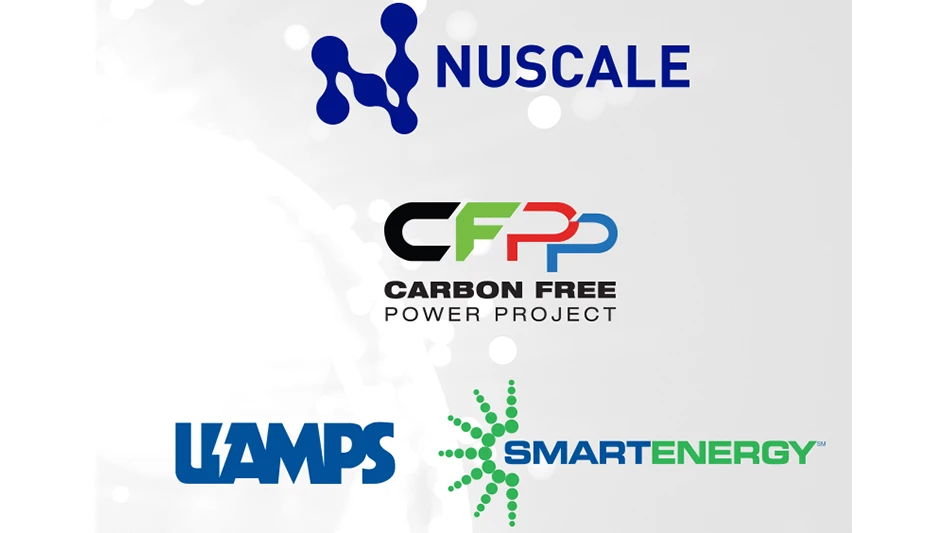
Graphic courtesy of NuScale Power LLC
A planned project proposed by NuScale Power LLC to build pioneering small modular nuclear reactors (SMRs) in the western United States has been terminated, the Portland, Oregon-based company has announced.
In April of last year, steelmaking and scrap recycling company Nucor Corp., based in Charlotte, North Carolina, announced it had invested $15 million in NuScale, with Nucor President and CEO Leon Topalian saying at the time, “The continued development of small modular nuclear reactors is critical to ensure our nation has carbon-free, baseload power, which is why we are making this investment in NuScale.
“As America’s largest steel producer and a significant energy consumer, we are looking for safe and reliable sources of power generation that are consistent with our sustainability goals.”
About 18 months later, however, the Utah Associated Municipal Power Systems (UAMPS) project to use the NuScale SMR design has met its end after NuScale failed to secure enough subscriptions from municipal utilities to make the project economically viable, according to groups opposing the project.
The opposing groups include the Utah Taxpayers Association, the Healthy Environment Alliance of Utah (HEAL Utah) and the Institute for Energy Economics and Financial Analysis (IEEFA), based in Lakewood, Ohio.
“As we have said for many years, taxpayer-funded entities should not be acting as venture capitalists on risky projects, no matter what the nature of the project is,” says Rusty Cannon, president of the Utah Taxpayers Association, in reference to the proposed 924-megawatt SMR project.
“We're happy for the communities and ratepayers who have dodged a huge financial debacle as a result of the cancellation of NuScale and UAMPS’ proposed SMR project," adds David Schlissel of IEEFA, who authored a 2022 analysis of the UAMPS/NuScale project. "As we have repeatedly shown, this project and the other SMRs that are being hyped by the nuclear industry and its allies are simply too late, too expensive, too uncertain and too risky. There are less risky and more proven alternatives for addressing growing energy needs and the global warming crisis.”
On the project’s demise, NuScale CEO John Hopkins says, “Our work with the [Utah] Carbon Free Power Project (CFPP) over the past 10 years has advanced NuScale technology to the stage of commercial deployment; reaching that milestone is a tremendous success which we will continue to build on with future customers.
“NuScale will continue with our other domestic and international customers to bring our American SMR technology to market and grow the U.S. nuclear manufacturing base, creating jobs across the U.S.”
On behalf of UAMPS, CEO Mason Baker says, “This decision is very disappointing, yet, this decision is the best course for the UAMPS members participating in the CFPP and doing what is best for those member communities will always be the guiding light in such decisions.”
In 2020, the UAMPS CFPP project was awarded $1.4 billion from the U.S. Department of Energy as a subsidy. “It’s uncertain what will happen to federal subsidy now that the project has been terminated,” the groups say.
They also note as of Nov. 8, NuScale’s stock price had declined to $2.20 per share from a previous peak of $14.87 in August 2022, about four months after Nucor announced its investment.
The groups say the 2022 IEEFA analysis had found that while initial cost estimates for the project were in the $55 per megawatt hour (MWh) range, that number had started to rise closer to the $100 MWh range.
“As we have directly addressed to UAMPS members for the past six years, the CFPP was never viable in terms of cost, timeline or execution,” says Lexi Tuddenham, executive director of HEAL Utah.
Latest from Recycling Today
- BMW Group, Encory launch 'direct recycling’ of batteries
- Loom Carbon, RTI International partner to scale textile recycling technology
- Goodwill Industries of West Michigan, American Glass Mosaics partner to divert glass from landfill
- CARI forms federal advocacy partnership
- Monthly packaging papers shipments down in November
- STEEL Act aims to enhance trade enforcement to prevent dumping of steel in the US
- San Francisco schools introduce compostable lunch trays
- Aduro graduates from Shell GameChanger program





